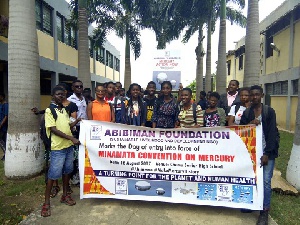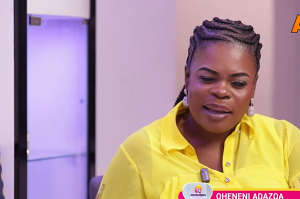Mr. Ebenezer Essilfie-Nyame, Environmental Research and Partnership Director, Abibiman Foundation, has called on the Government of Ghana to ban the production and use of mercury as directed by the Minamata Convention on Mercury.
He said this on Wednesday during the marking ceremony in Ghana of the coming into force of the Minamata Convention on Mercury.
The celebration which was organized by the Abibiman Foundation, a Non-Governmental Organization (NGO) in Tema, aimed at informing students about the devastating effects of the use of Mercury to the human body and the environment.
“The convention which is supposed to take effect today, states a lot of things for governments to do. The idea is to ban the production of mercury by 2020, that is what the governments across the world are supposed to do,” he informed.
He acknowledged Ghana’s Minister of Energy, Mr. Boakye Agyarko’s call to ban mercury use by 2018, but queried the steps that had been put in place.
“These are questions we need to answer and we need real facts; we need steps and guidelines that the government is going to use to make sure that this thing ultimately takes place,” he demanded.
He observed that in Ghana mercury was used by Small Scale Miners (SSMs), Hospitals, etc. and so government must put in place measures to ban it, and consider an alternative substance to replace its use.
He said “we do not know how much mercury is imported into the country, what channels are used in the importation, how they are stored, how they are protected, how the SSMs come into contact with the substance, how they are used, how the waste water is treated and disposed off.”
He added that, “It could be that we are taking in mercury but we don’t know, so it is a very big issue. We hear of deaths every day, and we attribute them to other diseases, but people aren’t tested for mercury poisoning. How are we even sure the fishes we consume near illegal mining sites are not poisoned by mercury?”
Mr Amoateng lauded the environmental Protection Agency for putting in place a national planning committee toward the banning of mercury but said that alone would not be enough.
He called for “research into sources of illegal mercury imports, including the existing or likely mercury entry points into Ghana, and the distribution networks within the country, coordination with our neighboring countries, involving stakeholders in the implementation and continuing development of the national action plan
As well as ensuring transparency, monitor and implementation of the Minamata Convention on Mercury, however, will definitely fail if the monitoring, evaluation and accountability structure is weak”.
He informed of the devastating consequences of mercury poisoning on health, and therefore observed that even if water companies cleaned drinking water, fishes could be poisoned through mercury contamination and that could be transferred to humans.
He gave some of the effects of mercury poisoning to include numbness of hands, impairment of eyesight, speech impairment, people going into coma and death.
Adopted in October 2013 and in accordance with Article 31, the Minamata Convention enters into force, ninety days after the date of deposit of the fiftieth instrument of ratification, acceptance, approval or accession, which happened on May 18th, 2017.
So far, there are 128 Signatories and 74 Parties to the Convention including Ghana which signed the Convention on 24 September 2014 and ratified it on 23 March 2017.
From 2020, the Convention will ban the production, import and export of products that contain mercury, including blood pressure monitors, clinical thermometers, high-pressure mercury lamps, and topical antiseptic agents.
Until 2020, the Convention will encourage signatory countries to gradually reduce their use of mercury and in the case of small-scale gold mining, for which mercury is being used indiscriminately, the Convention has stipulated reduction in usage of mercury.
General News of Thursday, 17 August 2017
Source: GNA













